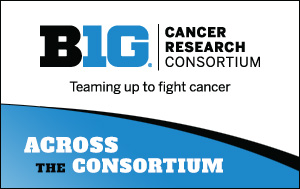Dec. 21, 2017:
Researchers have made great strides in the fight against cancer through recently approved immunotherapy drugs, including pembrolizumab and nivolumab, drugs that target a specific interaction between cancer cells and T cells.
Part of a class of immune therapies known as checkpoint inhibitors, these drugs target the programmed death-1 / programmed death-ligand 1 (PD-1/PD-L1) pathway. PD-1/PD-L1 drugs have led to durable responses in patients whose tumors responded to therapy.
“However, most patients with advanced kidney cancer — up to 3 in 4 patients — do not benefit from these drugs,” said Ajjai Alva, MD, of the University of Michigan. “We believe that a significant factor influencing the low response rate can be found within the tumor microenvironment and hope that adding a drug that targets DNA methylation to the PD-1/PD-L1-targeting drugs might lead to improved response rates.”
Dr. Alva is leading a new Big Ten Cancer Research Consortium study, known as BTCRC-GU16-043, that is looking at ways to expand the proportion of patients with advanced kidney cancer who respond to PD-1/PD-L1 therapy.
Dr. Alva believes a significant factor influencing the low response rate can be found within the tumor microenvironment. Dr. Alva hopes that adding a drug that targets DNA methylation to the PD-1/PD-L1-targeting drugs might lead to improved response rates.
Cancer cells can become resistant to cancer drugs such as chemotherapy or immunotherapies. Sometimes cancer cells turn genes off in order to hide from the immune system. One way cancer cells turn genes off is by a process called “methylation.” Methylation of a gene is like having layers of paint on the gene. If the gene gets so coated that it can’t be read, it turns off. In order for the immune system to find and attack the cancer, these genes need to be turned back on or uncovered. Drugs called hypomethylating agents can help turn genes back on or peel off the paint. Guadecitabine is a hypomethylating agent that may help turn certain immune signals back on.
Durvalumab (also known as Imfinzi™) is approved by the U.S. Food and Drug Administration (FDA) to treat advanced bladder cancer. Guadecitabine has not been approved by the FDA to treat any disease. The use of durvalumab and guadecitabine should be considered investigational. “Investigational” means this combination has not been approved by the FDA.
The single-arm phase Ib/II study, will enroll a total of 52 subjects with advanced clear cell renal cell carcinoma. Subjects will be enrolled into one of two cohorts. Cohort 1 will enroll 36 subjects who have received up to one prior therapy, but have not received prior anti-PD-1/PD-L1/CTLA4 therapy. Cohort 2 will enroll 16 subjects who have received up to two prior therapies, one of which must be a prior anti-PD-1/PD-L1 drug to which they did not respond.
Researchers will study durvalumab combined with guadecitabine in two parts:
- Part One will investigate the safety and appropriate dosing of guadecitabine in combination with durvalumab. Up to 12 people will participate in the first part.
- Part Two will investigate the percentage of patients whose tumor shrank after receiving guadecitabine with durvalumab. About 46 people will participate in the second part.
The BTCRC-GU16-043 study is now open to accrual at the University of Michigan Comprehensive Cancer Center. Additional sites will open the study in the near future.
The trial is supported by AstraZeneca Pharmaceuticals, LP, and Astex Pharmaceuticals, Inc.
For more information about this study, including full eligibility requirements, visit www.clinicaltrials.gov (study #NCT03308396).
About the Big Ten Cancer Research Consortium: The Big Ten Cancer Research Consortium was created in 2013 to transform the conduct of cancer research through collaborative, hypothesis-driven, highly translational oncology trials that leverage the scientific and clinical expertise of Big Ten universities. The goal of the Big Ten Cancer Research Consortium is to create a unique team-research culture to drive science rapidly from ideas to new approaches to cancer treatment. Within this innovative environment, today’s research leaders collaborate with and mentor the research leaders of tomorrow with the unified goal of improving the lives of all patients with cancer.
About the Big Ten Conference: The Big Ten Conference is an association of world-class universities whose member institutions share a common mission of research, graduate, professional and undergraduate teaching and public service. Founded in 1896, the Big Ten has sustained a comprehensive set of shared practices and policies that enforce the priority of academics in the lives of students competing in intercollegiate athletics and emphasize the values of integrity, fairness and competitiveness. The broad-based programs of the 14 Big Ten institutions will provide over $200 million in direct financial support to almost 9,500 students for more than 11,000 participation opportunities on 350 teams in 42 different sports. The Big Ten sponsors 28 official conference sports, 14 for men and 14 for women, including the addition of men’s ice hockey and men’s and women’s lacrosse since 2013. For more information, visit www.bigten.org.


 Educational background: BS, Wayne State University School of Medicine: MD, University of Cincinnati: Residency in adult neurology, Memorial Sloan Kettering Cancer Center: Fellowship in neuro-oncology
Educational background: BS, Wayne State University School of Medicine: MD, University of Cincinnati: Residency in adult neurology, Memorial Sloan Kettering Cancer Center: Fellowship in neuro-oncology















Subscribe to the Big Ten CRC Newsletter X
X Facebook
Facebook YouTube
YouTube